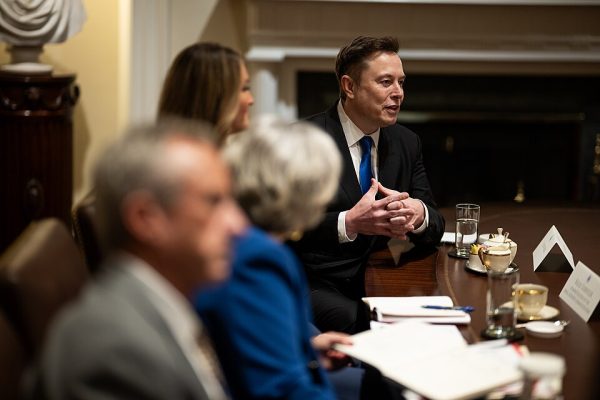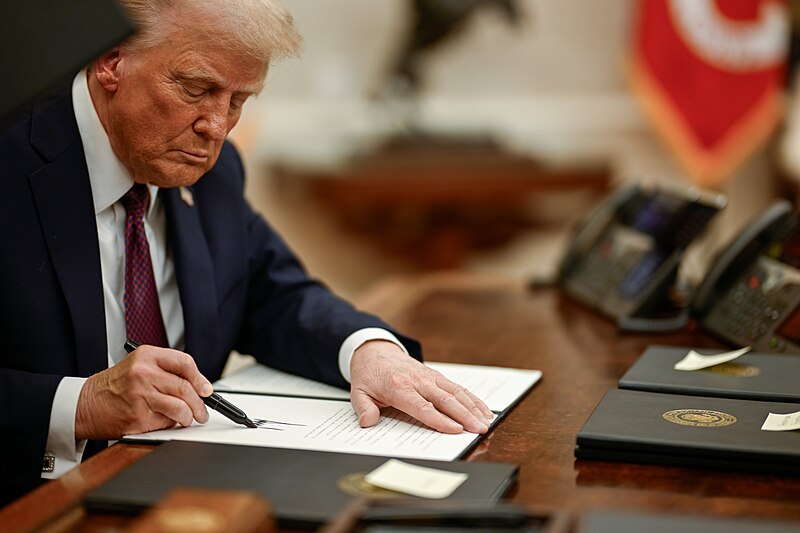“Nothing will stand in our way.”
With six words, President Trump set the tone for his approach to a second term, promising to mount a fundamental challenge to the post-Watergate conventions of presidential authority and vowing to be unrestrained in implementing his ambitious agenda, even in defiance of legal limits. Within a week, he quickly made clear that his campaign pledges were not meaningless gestures.
In his 29-minute inaugural address, Trump aggressively asserted that he would not be deterred from his triumphant return to the presidency by constitutional guardrails. He exulted an improbable resurrection as a vindication of his often divisive policies, ending a four-year political exile in which he survived a criminal conviction and indictments. “We’re going to do things that people will be shocked at,” he declared.
And in his first week in office, Trump began exacting retribution against his political enemies by revoking security protections from his former personnel, ordering the Justice Department and intelligence agencies to search for political bias and removing protections from career civil servants. He also issued pardons for even the most violent Jan. 6 rioters while commuting the sentences of militia leaders who were convicted of seditious conspiracy.
Trump and his associates, including the billionaire Elon Musk, have been given wide latitude in managing the machinery of the government. They have moved to restructure the federal government to centralize authority within the Oval Office, ending political independence across a vast number of agencies in a wide-reaching effort that has left no tool of government unleveraged.
Through the president’s so-called Department of Government Efficiency, Musk, who has numerous financial interests with the government, has waged an unprecedented war against the federal bureaucracy. Since Trump’s inauguration, he and his allies have steadily increased their control within the federal government by ousting officials who have refused to comply with their demands.
In a Musk-led operation that parallels his cost-cutting tactics at Twitter, federal agencies provided exits to millions of employees — an offer forcing federal workers to accept a sweeping incursion into the federal government or resign. The Trump administration has furthered its pressure on government employees in recent weeks, convening tense meetings as a campaign to reject the deferred resignation program intensifies.
Trump’s most audacious orders have been defeated in the courts — if temporarily — where an invigorated judiciary has acted swiftly to issue injunctions against the federal government in its sprawling efforts, including ending birthright citizenship in the United States; coercing employees to accept the deferred resignation program; and releasing nearly all employees at the U.S. Agency for International Development.
In response, the White House has vehemently fought back against those legal challenges. A federal judge ruled in February that the Trump administration had defied a judicial mandate to release billions of dollars in federal grants. And hours earlier, Vice President JD Vance asserted in a social media post that “judges aren’t allowed to control the executive’s legitimate power,” potentially setting the stage for a constitutional crisis.
“He who saves his Country does not violate any Law,” Trump said in a social media post in February, first posted on his platform Truth Social, and then on X, owned by Musk. The quotation, in a slightly altered form, is often attributed to Napoleon Bonaparte, the imperialist emperor of France, though its origins are unclear. Its meaning was not as ambiguous.
“The Return of the King”
In mid-2017, shortly after he said he would recuse himself from the investigation into Russia interference in the 2016 election and appointed the special counsel Robert Mueller, Attorney General Jeff Sessions entered the Oval Office for a private conversation with Trump. The president had an unprecedented demand for Sessions: prosecute Hillary Clinton.
“The president called him at home and asked if Sessions would ‘unrecuse’ himself,” according to Mueller’s report. “The ‘gist’ of the conversation was that the president wanted Sessions to unrecuse from ‘all of it.’” The request was corroborated by a White House aide, Rob Porter, who wrote that Trump told Sessions that he would “be a hero.”
The order was a departure from Trump’s previous comments on Clinton and her husband, former President Bill Clinton, including encouraging his vociferous audience to chant “lock her up” throughout his campaign. In an interview weeks after the election, the president-elect soberingly said he wouldn’t seek “to hurt the Clintons” after a particularly “vicious” election cycle.
Yet in the years after his comments, Trump exerted regressive dominance over his political foes. He sought to leverage the Internal Revenue Service’s broad investigative authority against numerous enemies, including James Comey, the FBI director he dismissed in May 2017; Andrew McCabe, the bureau’s deputy director; Peter Strzok, the lead FBI agent on the Russia investigation; and Lisa Page, a bureau official who communicated with Strzok, according to John Kelly, Trump’s former chief of staff.
Averting a move that would have imperiled Trump’s presidency, Sessions — as did many of the president’s aides — declined to act. But the increasingly infuriated president took matters into his own hands, telling aides that if Sessions would not order the Justice Department to investigate Clinton and Comey, he would prosecute them himself, even against the advice of Don McGahn, the White House counsel.
Trump has returned to the White House emboldened by a ruling from the Supreme Court in July that granted presidents broad prosecutorial immunity for acts taken in office. And he has also become more embittered and more aggrieved after four criminal indictments. In May, Trump was found guilty of falsifying business records, becoming the first convicted felon to be sworn in as president — even if his sentence was largely symbolic.

He has embraced a regal view of the presidency, drawing contrast to predecessors who have historically averted being seen as a king. But he has also shown an adoration for the imperialist phrase “manifest destiny” in ignoring sovereign borders. And in his Inaugural Address, he proclaimed that he was “saved by God to make America great again” after he survived an assassination attempt in July.
Since taking the throne, Trump has only further likened himself to royalty. After his administration moved to end New York’s congestion pricing initiative, he proclaimed, “Long live the king!” Hours later, the White House shared a magazine cover, an imitation of Time, depicting a grinning Trump wearing a crown.
“The Return of the King,” Musk wrote on X after the election.
“Promises Made, Promises Kept” (what)
“America has given us an unprecedented and powerful mandate,” Trump triumphantly told a jubilant audience who had gathered at a convention center in West Palm Beach, Fla., for an electoral victory party — even as votes were still being counted. The soon-to-be-president declared that he would not renege on his campaign pledges. “I will govern by a simple motto: promises made, promises kept.”
In expansive, if embattled, executive orders, he has made good on his promises.
By informing the Justice Department not to prosecute app stores and cloud computing companies that host TikTok, Trump effectively nullified a federal law banning the popular app from the United States, giving companies that continue to provide TikTok’s services uncertain legal standing in exchange for the support of a mercurial president. His order faced no congressional opposition, despite bipartisan support for the ban.
Likewise, Congress has offered a muted response to Trump’s efforts to dismantle the Education Department and other agencies long scorned by Republicans, including the Consumer Financial Protection Bureau and the United States Agency for International Development, which were created by various acts of Congress and cannot be unilaterally shuttered by the president.
In deciding to impose stiff tariffs on Canada, Mexico and China — the United States’ largest trading partners — he set the stage for a trade war that would have significant implications for the global economy, weakening the American economy and stalling investment. And the president’s menacing rhetoric towards Canada, including threatening to annex the country, has increased tensions with no immediate benefit.
By negotiating with President Vladimir Putin of Russia on the fate of Ukraine while subverting the involvement of its president, Volodymyr Zelensky, while refusing to denounce Putin for starting the war, Trump sharply deviated from the postwar “rules-based international order” approach that has guided U.S. foreign policy on Russia for decades, granting Moscow justification for ignoring Zelensky’s requests.
In a memorandum signed in February, Attorney General Pam Bondi directed the Justice Department to investigate the “weaponization” of the criminal justice system by officials who have brought criminal charges and civil suits against Trump, including the former special counsel Jack Smith, the Manhattan district attorney Alvin Bragg and the New York attorney general Letitia James.
And later month, Emil Bove, the acting deputy attorney general, ordered the acting U.S. attorney general for the Southern District of New York, Danielle Sassoon, to drop charges against Mayor Eric Adams of New York City, arguing that the investigation into Adams would impede the Trump administration’s immigration efforts in the city. In response, Sassoon and five officials with the public integrity section resigned.
The Justice Department’s decision to seek a dismissal of charges was a stunning conclusion for a high-profile case that federal prosecutors and investigators had vigorously pursued for years. But critics of the mayor say Adams, who had sought to enjoin his legal peril with Trump’s and cultivated a close relationship with him in the months after the election, is now beholden to the president.
“The president is holding the city and the mayor hostage,” the Rev. Al Sharpton said in an interview.
Most prominently, Trump has enforced his will on influencing American society, giving his opinions on a sweeping range of spheres of life. In the last three months, he has criticized the National Football League for changing its kickoff rules; moved to end the federal government’s use of paper straws; blocked an Associated Press reporter from entering the White House over the organization’s refusal to refer to the Gulf of Mexico as the Gulf of America; and appointed himself chairman of the John F. Kennedy Center for the Performing Arts, vowing to halt production of “drag shows” at the cultural center.
In a barrage of executive orders last month, Trump intensified his retaliatory campaign against Democratic-leaning lawyers and law firms that he has decried for engaging in “lawfare” against him and his allies. He issued a memorandum directing Bondi and Homeland Security Secretary Kristi Noem to “seek sanctions against attorneys and law firms who engage in frivolous, unreasonable and vexatious litigation against the United States.”
The orders have divided the legal profession. Last month, Trump announced that Skadden, Arps, Slate, Meagher & Flom had reached an agreement with the White House to provide $100 million in pro bono work. Hours earlier, Jenner & Block and WilmerHale sued to stop an executive order that would remove their lawyers’s security clearances, prevent government officials from contacting the firms and block them from entering government buildings.
Loyalists in the White House (how)
In the weeks after FBI agents searched Mar-a-Lago, Trump’s private residence and estate in Palm Beach, Fla., in August 2022, Kash Patel worked to assuage the infuriated former president. “The Mar-a-Lago raid will go down in history as a sign of the destruction of our once great institutions of equal justice and fairness,” he wrote in his memoir “Government Gangsters.”
Patel was not the only Trump ally who had worked to influence the former president in one of his darkest moments. But few have been able to be recognized by Trump for their unapologetic loyalty — and even fewer have earned an esteemed position, much less at a time when many senators appear sympathetic to Trump’s claims of bias within the Justice Department.
Just over two years later, Trump returned the favor, vowing to replace Christopher A. Wray, the FBI director, with Patel, a move that would see the bureau led by a hard-line critic who has called for firing its leadership, closing its Washington headquarters and bringing federal law enforcement agencies “to heel.” And it would align the nation’s premier investigative agency with the president’s anti-establishment beliefs.
“The FBI has fallen into old bad habits and is long overdue for massive reform,” Senator Chuck Grassley, Republican of Iowa and the chairman of the Judiciary Committee, said in his opening statement ahead of a committee vote to advance Patel’s nomination. “Patel should be our next FBI Director because the FBI has been infected by political bias and weaponized against the American people.”
Indeed, Patel sought to remove that perceived bias even before he was confirmed. In a letter to the Justice Department’s inspector general, Senator Dick Durbin of Illinois accused Patel of covertly directing a purge of career officials at the bureau and suggested that Patel may have lied under oath when he said that he was “not aware” of any plans to fire officials who were involved in investigating Trump, despite having been in alleged contact with Trump political appointees at the FBI.
Patel’s nomination was a rebuke of the tempered strategy Trump once reluctantly embraced, seeking the personal appeasement from unwilling career civil servants and longtime agency officials who rejected his demands. In private meetings, Trump demanded Comey’s loyalty and suggested that he end an investigation into the president’s former national security adviser, Michael Flynn.
Yet in his first term, Trump attempted to install Patel as the deputy FBI director. But his efforts were defeated by Attorney General William Barr, who directly described Patel as unqualified and a grave threat to the FBI. Barr later wrote in his memoir that Patel would become the bureau’s second highest-ranking official “over my dead body.”
And in the final days of his presidency, Trump devised a plot with Jeffrey Clark, a Justice Department lawyer, to oust Jeffrey Rosen as acting attorney general, as part of a last-ditch effort to force Georgia state lawmakers to overturn the state’s election results. Their plan was averted by senior officials, who threatened to resign in a mass departure that would have incited furor.
Four years later, the schemes that once made for fiery journalistic exposés and best-selling tell-alls are no longer necessary for the Trump administration to assert its dominance. The Senate confirmed Patel in a narrow but symbolic vote in February, signaling that Republicans, faced with risking the wrath of Trump’s movement, have become more amenable to the president’s demands.
Patel is not the only Trump loyalist in the White House. In recent months, Trump has sought to appoint ardent allies to key positions, including Pete Hegseth, the combative Fox News host who earned the president’s favor in his first term, as defense secretary; John Ratcliffe, a trusted ally, as director of the CIA; and Matt Gaetz, the embattled representative from Florida who was forced to withdraw as Trump’s nominee for attorney general after allegations of sexual misconduct and drug use emerged.
His selections have reflected a seering distrust of career government officials that he has derided as the “deep state,” and, in the case of former Senator Marco Rubio of Florida and Representative Elise Stefanik of New York — two critics turned supporters of the president — an emboldened display of control in the Republican Party. In a social media post weeks after Patel’s nomination, Trump announced that Dan Bongino, a right-wing pundit, would be the next deputy director of the FBI.
“My entire life right now is about owning the libs,” Bongino said in 2018.
But perhaps the most consequential personnel decision came when Trump enabled Musk to execute an aggressive takeover of the federal bureaucracy. In a matter of weeks, the billionaire’s team gained control of various computer systems across departments, seeking to access databases containing sensitive personal data. And it has commandeered the Office of Personnel Management, the government’s human resources agency, in an effort to pressure federal workers to resign.
“Elon is doing a great job, but I would like to see him get more aggressive,” Trump said in a post on Truth Social in February.
Musk swiftly responded, threatening to fire federal workers who would not detail their workweek to the Department of Government Efficiency. Shortly after Musk’s order, the Office of Personnel Management sent an email to millions of government employees with the subject line, “What did you do last week?”
The email set off hastily organized discussions among cabinet officials in charge of the nation’s intelligence agencies, who quickly sought to prevent their employees from disclosing national security secrets. “The FBI, through the Office of the Director, is in charge of all of our review processes, and will conduct reviews in accordance with the FBI procedures,” Patel wrote an email to FBI employees.
But even as Trump officials privately voice displeasure with Musk, his reach within the federal government has only increased. The billionaire was set to receive a briefing from Hegseth on the U.S. military’s plan for a potential war with China earlier last month, an extraordinary show of his increasingly expansive government role. The meeting was later canceled after several news outlets reported on the plans.
“This is our one & only chance to restore democracy from the dictatorship of the bureaucracy,” Musk wrote on X in February. “It is now or never. It must be now.”






































